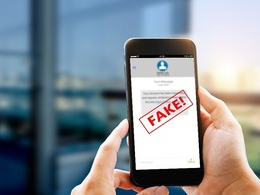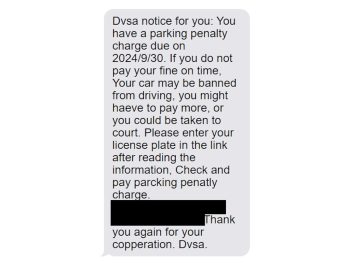The Driver and Vehicle Standards Agency (DVSA) is warning drivers to beware of scam text messages about fake DVSA parking penalty charges.

The text message warns people that they have a ‘parking penalty charge’, and that if they do not pay on time, that they might be banned from driving, have to pay more or be taken to court
The text message (see image below for example) typically says “Dvsa notice for you: You have a parking penalty charge due on 2024/9/30. If you do not pay your fine on time, Your car may be banned from driving, you might haeve to pay more, or you could be taken to court. Please enter your license plate in the link after reading the information, Check and pay parcking penatly charge. Thank you again for your copperation. Dvsa.”
The DVSA has stressed that it does not issue or deal with parking fines and that these messages are scams.
Anyone receiving a message can report the scam to the National Cyber Security Centre but does not need to contact the DVSA.
People who have been tricked into sharing personal information with a scammer, are urged to take immediate steps.
Anyone who has lost money or have been hacked as a result of responding to a suspicious text message should report this at www.actionfraud.police.uk or call 0300 123 2040 (in England, Wales or Northern Ireland). Victims in Scotland can contact Police Scotland by calling 101.

Consumer watchdog Which warned earlier this month that the new text message-based parking scam was doing the rounds, initially pretending to be from local councils and linking drivers to a fake government website to pay.
Which has set out four steps for drivers to check if they’re on a copycat website.
It’s the latest con to target drivers, following a rise in fake QR codes being used in parking and charging payment scams.
The RAC has warned drivers to be vigilant and advised how text recipients can check if they do need to pay a parking fine without falling foul of scammers.
RAC spokesman Rod Dennis said: “It’s incredibly unusual to receive a text about a parking fine if there wasn’t a ticket on your car in the first place – and the ticket normally includes information on how to pay.
“To be safe rather than sorry, we’d advise any recipients of the text to first check if they need to pay a fine with the authority rather than following the URL in the SMS. If a fine is due, ask for the payment options and, if you choose to pay it online, make sure the website is the genuine one and that any details you enter are sent securely.”

